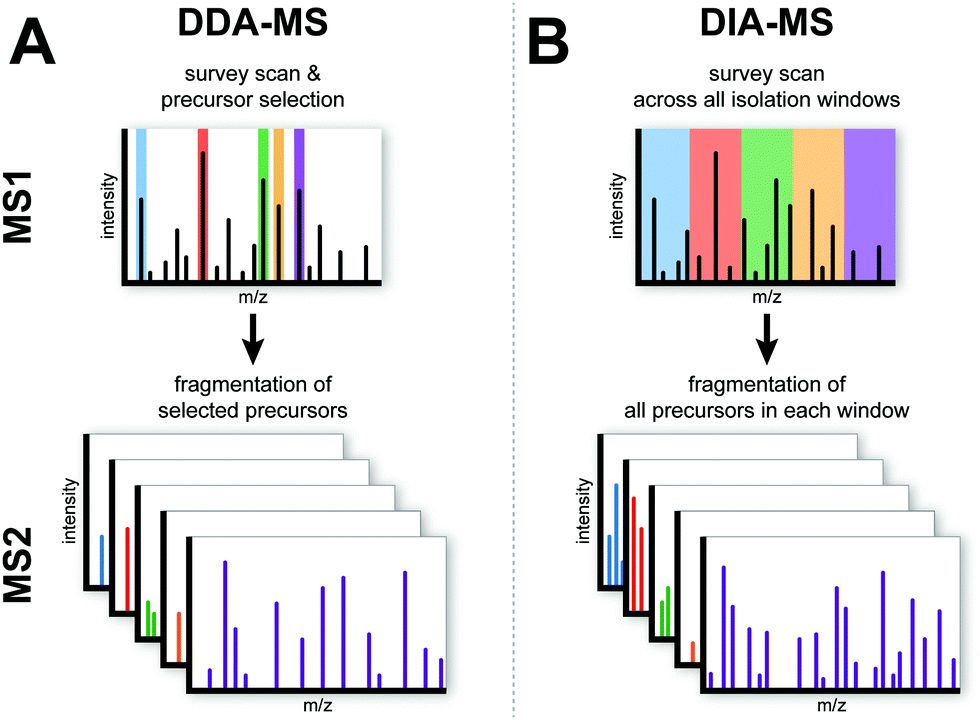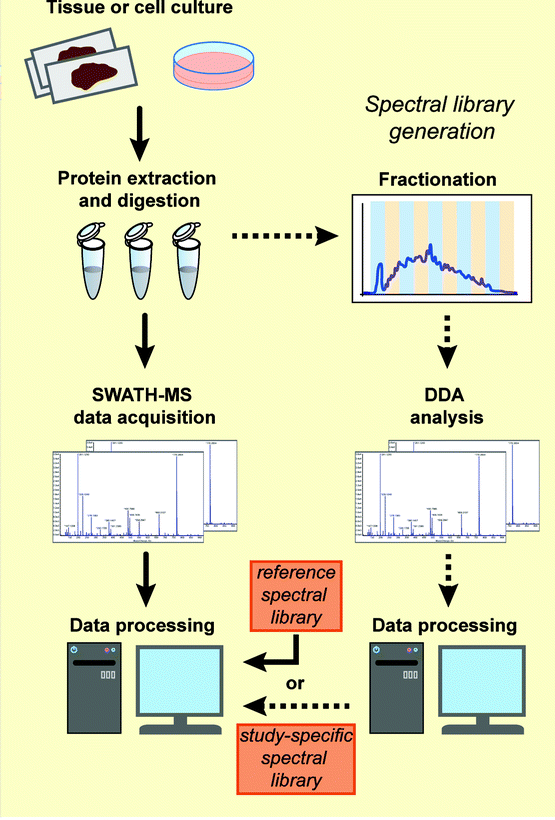DIA Mass Spec Service
DIA Mass Spec Service leverages DIA (Data-Independent Acquisition) technology to provide high-throughput and highly sensitive scanning for precise quantification of proteomic information in complex samples. This service reveals protein expression, modifications, and interactions within samples. DIA technology, as a data-independent acquisition method, collects ion information across the entire mass range simultaneously within a single analysis cycle, overcoming the limitations of traditional DDA (Data-Dependent Acquisition), which selectively targets specific ions. With its full-spectrum scanning capability, DIA technology delivers more comprehensive and accurate protein quantification data.

Krasny L, et al. Mol Omics. 2021.
Schematic Overview of the DDA-MS and DIA-MS
DIA Mass Spec Service precisely captures low-abundance proteins, making it particularly suitable for protein quantification in complex biological samples. In tumor research, DIA enables efficient quantification of tumor biomarkers, monitoring of tumor progression, and investigation of drug resistance mechanisms, supporting the development of personalized treatment strategies. Additionally, in neuroscience, DIA is employed to analyze proteomic changes in neurodegenerative diseases such as Alzheimer’s and Parkinson’s disease, providing deeper insights into pathological mechanisms.
DIA Mass Spec Service at MtoZ Biolabs
MtoZ Biolabs' DIA Mass Spec Service leverages cutting-edge data-independent acquisition (DIA) technology to overcome the limitations of traditional mass spectrometry, delivering comprehensive and precise proteomic analysis for complex samples. By unbiasedly collecting ion information across the entire mass range in a single analysis, DIA technology significantly enhances protein detection sensitivity and quantification accuracy, making it particularly suitable for in-depth exploration of low-abundance proteins and complex samples.
At MtoZ Biolabs, we employ a customized data analysis workflow combined with advanced algorithms and high-resolution mass spectrometry instruments to ensure that every analysis result is highly reproducible and reliable. Our DIA Mass Spec Service provides robust data support for protein function studies, drug development, and biomarker discovery, empowering researchers to achieve breakthroughs in these fields.

Krasny L, et al. Mol Omics. 2021.
Schematic Workflow of DIA-MS Experiments
Advantages of DIA Mass Spec
✅ High Throughput and Comprehensive Coverage
DIA technology captures ion data across the entire mass range in a single analysis, avoiding the limitations of selective acquisition in DDA methods. This ensures comprehensive sample coverage.
✅ Quantitative Precision
By using a data-independent acquisition approach, DIA minimizes missing data and bias, enabling more precise protein quantification, particularly for complex sample analyses.
✅ Adaptability to Complex Samples
DIA technology is highly adaptable to complex samples, capable of identifying and quantifying low-abundance proteins in multi-component mixtures, thereby improving data reliability and reproducibility.
✅ Reduced Data Loss
Compared to DDA, DIA reduces data loss or omission during sample processing, avoiding information gaps caused by selective ion monitoring.
Why Choose MtoZ Biolabs?
✅ Advanced Analysis Platform
MtoZ Biolabs established an advanced DIA Mass Spec Service platform, guaranteeing reliable, fast, and highly accurate analysis service.
✅ One-Time-Charge
Our pricing is transparent, no hidden fees or additional costs.
✅ High-Data-Quality
Deep data coverage with strict data quality control. AI-powered bioinformatics platform integrates all DIA Mass Spec Service data, providing clients with a comprehensive data report.
FAQ
When is DIA Mass Spec Service strongly recommended?
DIA Mass Spec Service is strongly recommended when analyzing complex biological samples with a broad dynamic range, such as plasma, tissues, or cell lysates. It is particularly useful for high-throughput proteomics studies, where comprehensive, reproducible, and quantitative data on both high and low-abundance proteins are required. Additionally, DIA is ideal when studying protein modifications, interactions, or when precise quantification across large datasets is essential.
MtoZ Biolabs, an integrated chromatography and mass spectrometry (MS) services provider.
Related Services
How to order?







